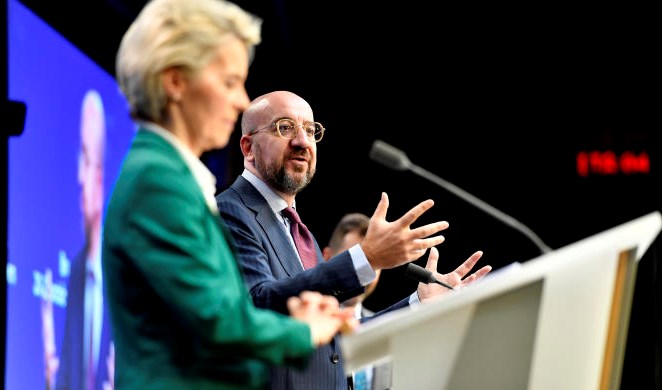EU not looking for 'systematic confrontation' with China
EU leaders warn against confrontation and deterioration of ties with China.
-

European Council President Charles Michel and European Commission President Ursula von der Leyen (AP)
EU leaders said Friday that they would defend their ideals and independence in dealings with China but warned against being dragged into confrontation and deterioration of relations. "This discussion showed a very clear will to avoid being naive, but neither did we want to embark into a logic of systematic confrontation," summit host and EU Council President Charles Michel said.
The 27-nation union had three hours of strategic talks on its approach to China during their Brussels meeting.
The EU has struggled to create a consistent policy toward Beijing, considering the need to access China's massive markets. "We will always be firm in standing up to defend our principles, democracy, fundamental freedoms," Michel said.
"We believe that we must be committed to bringing more reciprocity and rebalancing in particular in the economic relations between China and the EU."
Michel stated that the EU was still willing to work with China on significant world concerns, such as climate change and health. At the height of tensions between China and the United States, he stressed that the bloc had its "own model to develop."
Read next: EU looks to boost trade with China, other Asia-Pacific partners
EU executive head Ursula von der Leyen said Beijing was "continuing its mission to establish its dominance in East Asia and its influence globally." She warned against the close ties between China and Russia, while Moscow rocks the "world order" by launching a military operation in Ukraine.
"These developments will affect the EU-China relationship," von der Leyen said.
It is worth mentioning that last month and in light of the expected visit by the German Chancellor Olaf Scholz to China, Germany vowed on September 15 to impose a "robust trade policy" on Beijing, citing concerns of over-reliance on China and alleged human rights violations.
After hosting a meeting of G7 trade ministers, German Economy Minister Robert Habeck told reporters that any "naivety" in relations with China was "over". "The period when we said trade no matter what, whatever the social or humanitarian standards are" is over, Habeck said.
Germany, just like other western countries, sought to wrest back control of key technologies, such as batteries and semiconductors.

 3 Min Read
3 Min Read








